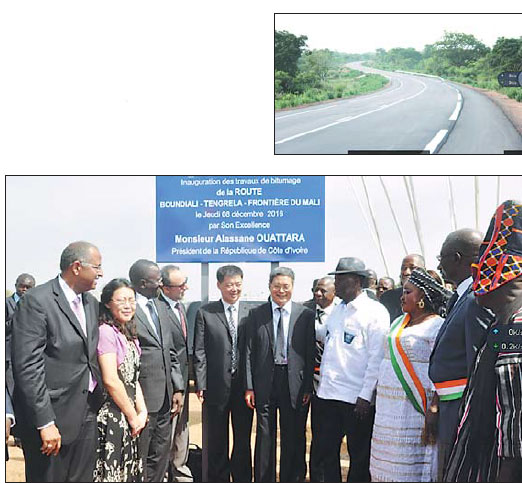'Road of Hope' completion bodes well for Cote d'Ivoire

A grand-opening ceremony was held in early December in Bolona, a small town in northern Cote d'Ivoire, for the completion of a trunk road to the border of Mali via Tingrela - marking the end of a marathon project that had lasted 18 years.
It's been dubbed the "Road of Hope" by Cote d'Ivoire and Mali.
The 42.5-kilometer section from Bolona to the Mali border was constructed by China Overseas Engineering Corp. It is the extension of the 92.5-kilometer Boundiali-Bolona road that was largely completed in early 2014 by the same company. Construction of the project, funded by the Islamic Development Bank, started in August 2015 and ended in June this year. It passed its final inspections and was accepted in November.
| Cote d'Ivoire President Alassane Dramane Ouattara (with hat) and COVEC deputy general manager Hu Tao (fifth from left) at opening ceremony for the road (above). Wang Lin / For China Daily |
The project has a long story that began in 1998 when COVEC signed the contract with the Ministry of Economic Infrastructure for the construction of the Boundiali-Tengrela-Mali trunk road.
Soon after work started, a coup took place in the country, cutting off investment money and forcing the project to pause. Workers were evacuated and equipment was transferred to neighboring Mali.
In 2002, both sides signed a contract to relaunch the project. In September of that year, an armed rebellion occurred in the country, devastating the construction site. The camp of the Chinese workers was occupied by the rebels, and equipment and materials were taken, damaged or expropriated.
In 2009 the project was launched for a third time, but an election crisis occurred in the following year. Workers on the site were forced to leave the country in January and March 2010.
After three forced suspensions and a fourth equipment and materials procurement, the project started again in February 2012. The political situation in the country was stabilizing, but little had been done on the road.
On May 4, 2012, Prime Minister Kablan Duncan visited the site. "I will give you one month," he said. "If the situation has not improved, the contract will be terminated."
The government wanted to see the road built.
With great efforts by COVEC, the asphalt pavement was completed on Dec 14, 2013. Four months later, upon completion of supporting projects, all was accepted.
In early 2015, the government of Cote d'Ivoire signed a contract with COVEC for an extension project - Bolona-Tingrela-Mali - because officials were impressed by the persistence of the company in assisting the country.
On April 26 this year, the prime minister hosted the opening ceremony for the extension project.
By Dec 8, the 130-kilometer Boundiali-Tengrela-Mali trunk road was finished.
"It was the culmination of the solemn commitment COVEC made to the local government and people," says Hu Tao, general manager of the Cote d'Ivoire branch of COVEC. "From the possible termination of the contract to the presence of its president at the opening ceremony, the four years saw some dramatic events for the company."
The project is part of the largest infrastructure construction project in Cote d'Ivoire - the comprehensive development of the port city of San Pedro to the southwest and to Mali in the north. It opens up contact with different areas along the road, and with the outside world.
It also links major cities in the western part of Cote d'Ivoire. When opened to traffic of the road will greatly improve access and help drive the development of the local economy.
panzhongming@chinadaily.com.cn
(China Daily Africa Weekly 12/16/2016 page28)
Today's Top News
- Expanding domestic demand a strategic move to sustain high-quality development
- Xi hears report from Macao SAR chief executive
- Xi hears report from HKSAR chief executive
- UN envoy calls on Japan to retract Taiwan comments
- Innovation to give edge in frontier sectors
- Sanctions on Japan's former senior official announced































